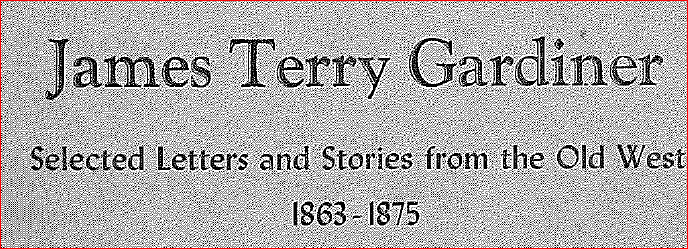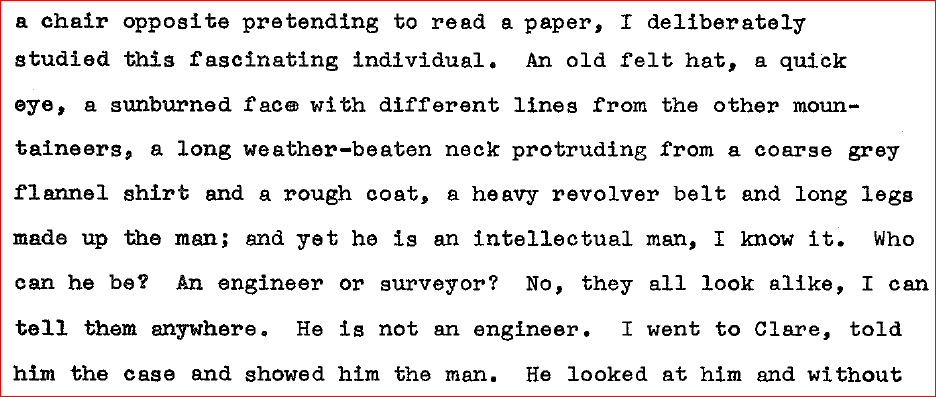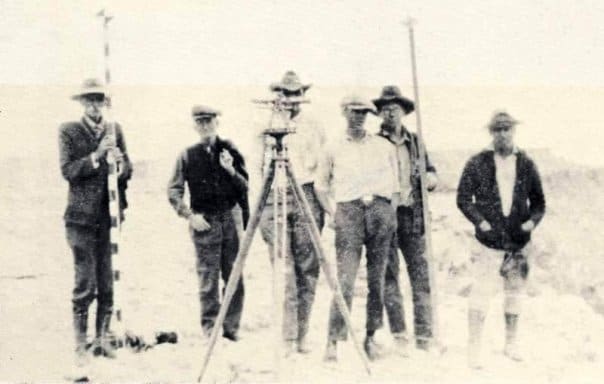A thread below started me thinking about how relatively few realistic accounts there are of land surveying work in print. In nearly the same breath I'll mention that I don't consider Thomas Pynchon's "Mason & Dixon" to be other than an annoyance.
There are the reports of the early explorations such as the "Journal of Andrew Ellicott" and the boundary commissions. There are terse reports to Congress upon very large and difficult surveys made pursuant to some act of that body, but these decline to give more than what is in effect an executive summary.
What I'm thinking of specifically are accounts that capture the inherently gritty nature of land surveying largely free of the gloss of eventual success. Some notable exceptions are the accounts given by O.W. Williams published as "Pioneer Surveyor, Frontier Lawyer" in which he recounted being on a surveying party in the Texas Panhandle of the 1870s overrun by a buffalo stampede and, thirty years later, surveying in the Big Bend with an assistant on friendly terms with a bottle of Sotol in camp at night.
The former Texas Surveyors Association published a couple of compilations of such accounts, but I don't recall any dating from the second half of the 20th century or later that hadn't been freed of the grit that was almost certainly in the actual work.
A New England surveyor named Heman Chase published a couple of volumes of anecdotes that were worth reading, if specific to New England.
Any others?
The Oklahoma State University Library at Stillwater has, among other tonnage, a diary of a young man that literally walked out here to Oklahoma to work as a surveyor. I cannot for the life of me remember his name. I read a portion of it a number of years ago and was captivated.
I remember on a specific date (he had been walking for a week and sleeping on the ground) he noted for breakfast he cooked his last salt pork and ate hardtack with some berries he had picked the evening before, wishing he had some sugar. He had eaten his last bit of meat because he planned to meet with the survey crew by the afternoon and wanted to appear strong.
A buddy of mine had read the same excerpt and we had planned to make a point to have a breakfast of bacon, dewberries and hardtack on that date the next year in honor of the surveyor. It never happened.
If I can remember I need to contact my friend to see if he remembers the young man's name or the details of his account. btw - It was a diary and not a story by any means, although the author had a flair for brief details.
There's "Journal of my journey over the mountains" by George Washington, with maps, available on Project Gutenberg.
Deane journal of Northeast Boundary Commission, 1838
https://www.mainememory.net/artifact/19364?popup=1
It's been a while but I seem to recall enjoying
Epic Wanderer: David Thompson and the Mapping of the Canadian West
Don't forget about the unfinished saga of Dave K. O'Reilly and the Indian Casino survey ...
Norman Van Valkenburgh has written a series of four murder mysteries based upon the adventures of Ward Eastman, fictional Catskill area surveyor.
"Murder in the Catskills", "Mayhem in the Catskills", "Mischief in the Catskills", and "Murder in the Shawangunks".
Having started my career in that neck of the woods, I found them interesting.
It's not James M. Cain, but it's entertaining, at least to this colonial state surveyor.
He also has several non-fiction titles, dealing with area surveying history, i.e., "Chains, Links and Gavels", "The Catskill Park: Inside the Blue Line", "Old Stone Walls", and "America's First Wilderness: N.Y. State's Forest Preserves".
In the same vein, I recommend "Footsteps Through the Adirondacks", by Nina Webb, The biography of Verplanck Colvin, who was last month the subject of the Surveyors Historical Society outing, held here in New York State.
He discovered the source of the Hudson River, and determined the altitudes of the most of the major peaks in what is now the Adirondack Park, which comprises over 6 million acres..
"comprehensive history of the early federal surveyors of the Pacific Northwest, the work they performed for the US General Land Office between 1851 and 1855"
I like some of the early surveyors diary discussions about how they had to break the ice in crossing swampy valleys and how they found it easier to get a meal and place to stay if they just did a quick knock and walk into the pioneer cabins found along their travels rather than knock and wait for a proper doorway discussion. Upon waiting for the later they would never get to stay.
https://www.amazon.com/Chaining-Oregon-Kay-Atwood/dp/0939923203
I have the Norman Van Valkenburgh set of four. Found them to be quite entertaining.
Interesting nonfiction read is the
Forgotten Expedition
1804-1805
Louisiana Journals of Wm. Dunbar and Geo. Hunter
LSU Press B.R.Louisiana
They were part of Jefferson's Corp of Discovery explorers. They conducted mapping and scientific and geological research in the lower part of the Purchase.
Red River and the Ozarks.
Dunbar was the Surveyor General of West Florida.
The book is a transcript of their original journals.
https://www.monticello.org/site/research-and-collections/william-dunbar
I thought that I had a PB of Derzu Uzala. Some adapted a novel
From the Kurazawa movie.
It is around here somewhere in the book archives.
It is titled Derzu the Trapper
The two I have that TSPS published are called "Three Dollars Per Mile" and "One League to Each Wind". I believe they are reprints of what the TSA published, but if they are not, and the titles come to mind, I am interested in learning the names of the books so I can give them a read.
And, in the future... will others have the same issues with what we are writing, or not writing?
Steve D, post: 395637, member: 433 wrote: And, in the future... will others have the same issues with what we are writing, or not writing?
You make a good point. It is one of the reasons I have started trying to take more pictures. I dont know that I could ever write more than an essay, but maybe some pictures of how we worked might do some good to somebody.
Paul Reid shared this with me several years ago. It is a diary of Harley Nettleton, a chainman on the 1883 Fairfield survey party in northwestern Nebraska. One of the interesting tidbits is how the lines were actually run vs. the official field notes version.
http://www.nebraskahistory.org/publish/publicat/history/full-text/NH1992Surveying.pdf
I love it. I always wondered where the term "viddles" came from. Guessing now I know.
Friday, May 25
"Cloudy and rainy. Mack's gang went out on the line today, and the rest of us
moved the camp up the creek about six miles at the foot of a large sand butte.
About four o'clock Mr. Fairfield came in camp and told us to hitch up and take
bedding and victuals over to the rest of the boys."
Courtesy of the internet: "Vittle is an obsolete alternative to the word victual, which is defined as food prepared to be eaten. A piece of chicken that has been grilled and is ready to eat is an example of a vittle."
Granny Moses was always fixin' vittles for Jethro to eat between meals.
[MEDIA=youtube]uFjav300GbQ[/MEDIA]
Monte, post: 395635, member: 11913 wrote: The two I have that TSPS published are called "Three Dollars Per Mile" and "One League to Each Wind". I believe they are reprints of what the TSA published, but if they are not, and the titles come to mind, I am interested in learning the names of the books so I can give them a read.
Yes, both those books are the Texas Surveyors Association publications I had in mind. One of my particular favorites is J.J. Bowden's "Surveying The Texas and Pacific Land Grant West of the Pecos River". Mr. Bowden was an attorney who had access to the files of the T & P Land Trust that included quite a bit of correspondence between the office in Dallas and Jacob Kuechler in 1878 in the course of his extensive survey. He captures the temperament of both Kuechler and his disgruntled assistant, James Peck, who though that he should have had the commission to do the work.
The fellow on the left in the blurry photo below taken in about 1919 is is yet another of the notably interesting figures who surveyed in West Texas in the late 19th and early 20th centuries. For years, I knew him only as R.S. Dod, which was how he signed his name, and only later learned that his full name was Robert Stockton Dodd, that he would have been 64 when this photo was taken if the date of 1919 is correct, and that he had arrived in Presidio County, Texas by an unusual route.
The stadia board that Mr. Dod (or "Captain Dod" as he was known) is holding was graduated in tenths of a vara (36 varas = 100 feet), so one can scale his height from just this blurry photo. He's obviously taller than GLO Commissioner Walker who stands immediately on Dod's right.






